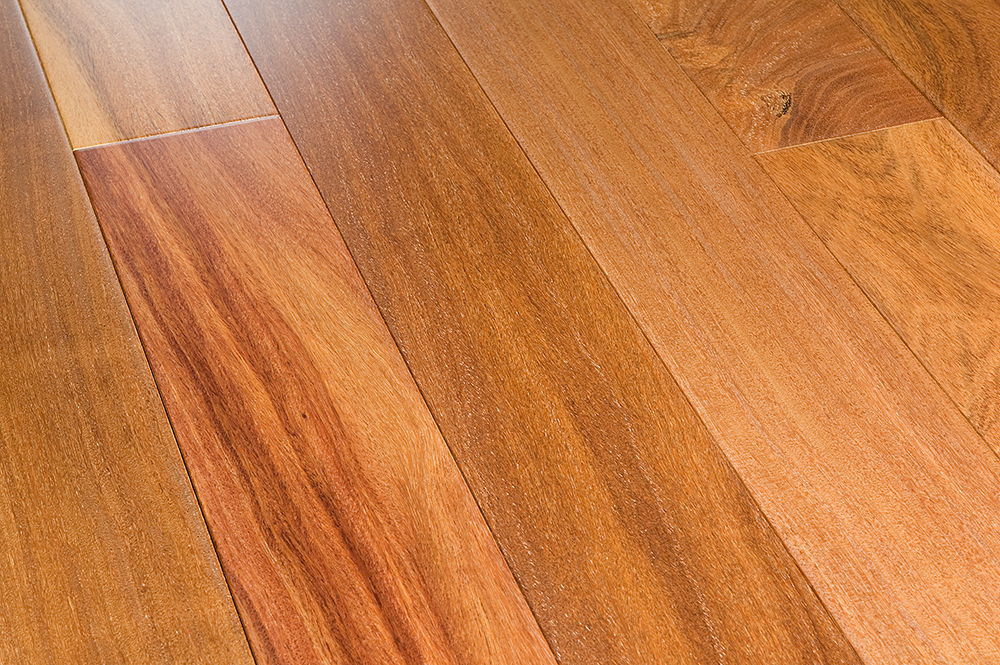When your reimagining, redefining, transforming a space with a new hardwood floor, knowing your options is pretty important.
We here at BuildDirect are continuing to expand the number of options for all kinds of building materials, including hardwood flooring. But, how do you decide on which option makes the most sense in the long run for visual and stylistic versatility, and longevity? Also, how will that option of hardwood flooring likely react, and “behave” once it’s installed in your space?
Cumaru stats
Latin name: Dipteryx odorata
Janka hardness scale: 3540
Common color spectrum: Brown to dark brown before UV exposure, light brown and gold after
Stability: medium (more stable than red oak)
Cumaru wood flooring species
One of our most recent launches this very week has been a selection of Cumaru hardwood flooring options. Here’s the skinny on how to answer some of these questions when it comes to this species of wood.
Cumaru (Dipteryx odorata) is sometimes known as ‘Brazilian Teak’ , an alternate name which is often used just a means to give you an idea of what it looks like. That’ practice is actually pretty common in the wood flooring industry. But, Cumaru a unique wood species, hailing not from Brazil exclusively, but South America in general where the wood must be responsibly harvested before it’s imported into North America.
Cumaru hardwood flooring characteristics
Here’s a shot of the ‘natural’ Cumaru hardwood floor, to give you an idea of the natural color range, and the grain pattern you’re likely to see.
As you’ve figured out in your research, any natural floor like this one is representative of a color range, rather than one solid and consistent color. With Cumaru, you get oranges, light browns, amber, ivory, and russet, which lends a visual warmth to a space.
With the tight grain patterns you’re seeing here in this particular section of floor (this is an example of our premier grade), and in general with the species, you’re getting some decorative subtleties that you can build on. If it’s understated artistry you’re after, Cumaru hardwood flooring might be the option for you.
How durable is Cumaru hardwood flooring?
Apart from the way it looks, the Cumaru wood species as flooring is naturally resistant to wear, since it’s so hard. It ranks a 3540 on the Janka hardness scale. What the heck does that mean? Well, it means that if one of the hardest wood species in the world is ironwood (or ipe) at 3680, then Cumaru isn’t far behind.
Like Ipe, Cumaru is a popular choice in solid hardwood decking, which proves its durability. Of course, this means your installer’s work is cut out for them when it comes time to cutting boards. But, once it’s in, it’s in.
Cumaru wood species and photosensitivity
Like many exotic hardwood species, Cumaru is likely to change color over time. This is due to it being a species prone to photosensitivity. This means that Cumaru reacts to sunlight, which turns its color range slightly darker over time. As such, when you’re planning an interior design to last over the period of years, make sure to take this into account.
For many, Cumaru tends to become more uniform in color over time, which can work to the advantage of some home decor plans. Sometimes, the intensity of the colors can fade. But, again, it’s a natural product, and will react uniquely to its surroundings, whatever they may be.
Enjoy more wood flooring options!
With the new launch, you have four options in Cumaru hardwood floors from which to choose, featuring some rich colors to suit any kind of decor. Have fun browsing!
And of course, you can learn more about Cumaru hardwood flooring in our (aptly named!) Learning Center.
Cheers,
Rob.
![[object Object]](https://assets.builddirect.com/images/logo-blue.png?auto=format&fit=max&w=384)



















